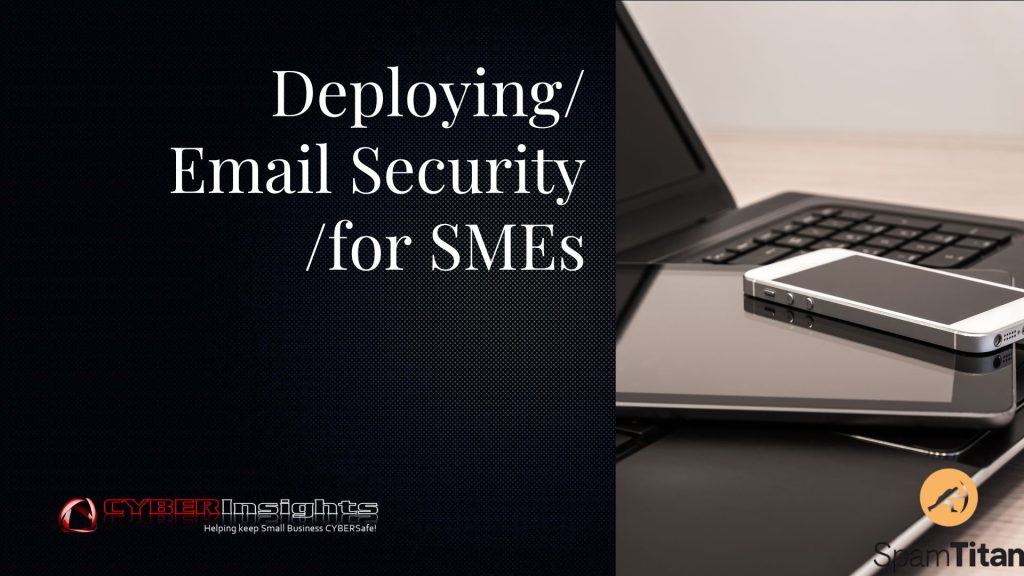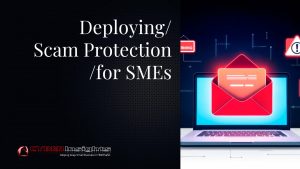DEPLOYING EMAIL SECURITY: Email Security for Your Small Business and the Best-Practice of Deploying It
October 24, 2024EMAIL SECURITY for Small Business Cybersecurity: A Comprehensive Guide For Small Businesses, email security is especially critical as it often serves as the primary mode of communication, making it a common target for cybercriminals.
What is Email Security?
Email security refers to the collective measures taken to protect email communications and accounts from unauthorized access, cyberattacks, and other threats. It includes a range of strategies and technologies that safeguard sensitive data, prevent Phishing attacks, detect malware, and ensure the confidentiality and integrity of communication.
Types of Email Security Solutions
There are various types of email security solutions that can be deployed to protect email systems, including:
Anti-Phishing Tools: These tools detect and prevent Phishing attacks by identifying malicious links or attachments in emails designed to steal sensitive information.
Spam Filters: Spam filtering systems detect and block unsolicited or harmful emails that could overload an inbox or carry malicious content.
Encryption: Encryption protects email contents by converting them into unreadable text until decrypted by the intended recipient, ensuring that sensitive data remains private.
Email Archiving: This solution automatically stores emails to allow for later retrieval. It is useful in compliance audits or legal investigations and ensures that emails are not accidentally deleted.
Email Authentication Protocols (e.g., SPF, DKIM, DMARC): These protocols help verify the legitimacy of incoming and outgoing emails, reducing the risk of email spoofing and impersonation attacks.
Malware Protection: Many email security tools include malware scanning that prevents harmful attachments or links from being delivered to the user’s inbox.

How Do Email Security Providers Operate and Charge?
Email security providers operate by offering Cloud-based or on-premises services that integrate with a business’s existing email infrastructure (such as Microsoft Outlook, Gmail, or custom servers). These services generally work in the background to scan, filter, and protect email communications in real-time.
Common ways email security providers charge include:
Subscription-Based Pricing: Providers typically offer services on a monthly or annual subscription, based on the number of email users or accounts. This is the most common pricing model for Small Businesses.
Tiered Pricing Plans: Providers may offer different plans depending on the level of security features required. For instance, a basic plan may include spam filtering and virus protection, while more advanced plans offer encryption, archiving, and compliance tools.
Per-User Pricing: Many email security services charge based on the number of users or accounts. This model is scalable and works well for Small Businesses that want to expand their security as they grow.
Pay-As-You-Go: Some providers allow businesses to pay for specific features or services as needed, rather than signing up for a full plan. This model is less common but can be useful for very small businesses or those with sporadic email security needs.
Why Email Security is Essential for Small Business Cybersecurity
Deploying email security is a smart and necessary investment for Small Businesses as it provides a robust layer of protection for digital assets. Small Businesses often have fewer resources for IT security, making them vulnerable to cyberattacks like Phishing, Ransomware, and business email compromise (BEC). These attacks can lead to financial losses, reputational damage, and even legal penalties if customer or employee data is compromised.
By implementing email security solutions, Small Businesses can:
Prevent Data Breaches: Phishing attacks are the most common method cybercriminals use to steal data. Anti-phishing tools and email authentication protocols help detect and block these attempts.
Ensure Regulatory Compliance: Many industries are required to comply with data protection laws (e.g., GDPR, HIPAA). Email encryption and archiving can help Small Businesses meet these requirements.
Protect Against Malware: Malware spread through email can cripple a Small Business‘s operations by locking systems or stealing data. Email security with malware protection helps keep this threat at bay.
Boost Employee Awareness: Email security solutions often come with training tools that educate employees on recognizing suspicious emails and avoiding risky behaviours, creating a more secure workplace.
Best Practices for Email Security in Small Businesses
To maximize the protection offered by email security solutions, Small Businesses should implement the following best practices:
Multi-Factor Authentication (MFA): Requiring more than just a password to access email accounts adds an extra layer of protection. MFA makes it harder for cybercriminals to gain access even if they steal passwords.
Regular Employee Training: Phishing attacks often succeed because employees are not aware of the risks. Regular training sessions on how to recognize phishing attempts, suspicious links, and email fraud can drastically reduce risks.
Implement Strong Password Policies: Encourage employees to use complex, unique passwords for their email accounts and change them regularly. Password managers can help maintain password security without relying on easy-to-remember (and therefore weak) passwords.
Email Encryption: Ensure that sensitive emails, especially those containing financial, customer, or confidential business information, are encrypted. This prevents unauthorized parties from accessing the contents even if they intercept the email.
Back-Up Emails: Regularly backing up emails ensures that important communications are not lost in the event of an attack or data corruption. This is critical for maintaining business continuity.
Use Spam Filters and Malware Protection: Enable advanced spam filtering and malware detection to reduce the risk of downloading malicious attachments or clicking on harmful links.
Conclusion
For Small Businesses, email security is a fundamental aspect of cybersecurity. With the right tools and practices in place, they can protect sensitive data, ensure compliance with industry regulations, and significantly reduce the risk of falling victim to cyberattacks. By investing in robust email security solutions and following best practices like MFA and employee training, Small Businesses can secure their communication channels and safeguard their overall digital infrastructure.

What is a VPN & Does my SME Need one? A VPN is a Virtual Private Network a method of securing your communications credentials. When it comes to Small and Medium-sized enterprises (SMEs), the choice of VPNs can significantly impact the security and efficiency of their operations.
The NordVPN service allows you to connect to 5600+ servers in 60+ countries. It secures your Internet data with military-grade encryption, ensures your web activity remains private and helps bypass geographic content restrictions online. Join NordVPN Today and Save up to 73% and Get 3 months Extra Free – Rude Not to …!
CYBER Insights – Helping Keep Small Business CYBERSafe!
Launched in 2020 by Cybersecurity Journalist Iain Fraser and his team at IfOnly… CYBERInsights was developed to be the go-to platform providing definitive, reliable & actionable Cybersecurity News, Intel, Awareness & Training specifically written and curated for Small Business & Enterprise Owners, Partners and Directors throughout the UK. #CyberInsights #CyberSecurity #CyberMedia #CyberPR #CyberAwareness #SME #SmallBusiness #smallbusinessowner











